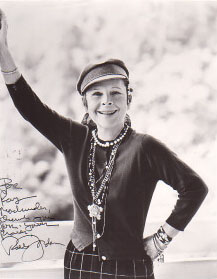Before I leave the subject of the second season of NBC's
Saturday Night (as it was known at the time) (and you should not construe this, by the way, as some sort of promise that I will now stop writing about the second season of NBC's
Saturday Night, because I promise nothing of the sort), I wanted to address a common misconception, fostered by Tom Shales and James Andrew Miller's oral history
Live From New York, about Chevy Chase. Shales and Miller write that Chase "left at the end of the first season, returning in later years only for cameos and guest-hostings." This is not true.
The first show of the second season was hosted by Lily Tomlin, and Chevy was a major part of it, doing his patented Gerald Ford "imitation." Chevy was not on the following week, with Norman Lear, nor the next one, with Eric Idle. On both shows he phoned in to explain his absence, which was purportedly due to a bad fall he had taken on the first show, injuring his back, but really, who knows. On one of those shows, Richard Belzer (who was the warmup comedian for the studio audience) actually did the opening, claiming he was really Chevy Chase.
Chevy was back for the Karen Black show, the fourth of the season, and Steve Martin's first-ever hosting duties, in show Number Five. In the great "Jeopardy 1999" sketch, one of the answers was "Comedian whose career fizzled after leaving NBC's Saturday Night [as it was known at the time]." No one got the question, which was "Who was Chevy Chase?" Then, in the season's sixth outing, Buck Henry mentioned during his monologue that it was Chevy's last show, and that was that. There wasn't even a fond farewell during the good night. For the record, the date was October 30, 1976.
[When Paul Simon hosted on November 20, 1976, the opening showed him entering 30 Rock via the 52nd Street entrance, and there was Chevy, strumming his guitar and singing "This Land Is Your Land" and "Do You Know the Way to San Jose?," with his guitar case opened up for tips.]
For the next four shows, there were only six Not Ready for Prime Time Players: Garrett Morris, Belushi and Aykroyd, Jane, Laraine and Gilda. But after the show returned from its Christmas break, on January 15, 1977, with Ralph Nader hosting, Belushi was missing. In his stead was a mustachioed young man named Bill Murray, who wasn't introduced during the opening but appeared in several sketches; the very first sketch after Nader's monologue, in fact, was a Murray solo spot. By the next week, with Ruth Gordon hosting, Murray was listed as a Not Ready for Prime Time Player.
As an aside, I was dubious about that Belushi absence, even dubiouser than I was about Chase's absence, because after all it was John Belushi. He called in during the show, as Chase had done, explaining that he had torn the meniscus in his knee. Yeah, right, I thought, making the drinkee-drinkee motion. But then the next week, the Gordon show, Belushi was back but appeared in only one sketch, as Dino De Laurentiis being interviewed about
King Kong by Tom Snyder on
Tomorrow; he remained seated the entire time. (He hobbled onto the stage for the good night wave.) The next week, with Fran Tarkenton hosting, the conceit was that Belushi was coaching the show from the sidelines, meaning he could stand still the entire time. Again, he limped onto the stage at the end. So the Belushi injury was legitimate.
My primary point here is that the shorthand description that most people apply is that Chevy left when the first season ended, and Murray then took his spot. As you can see, the truth is more complicated than that. But Shales and Miller should have figured it out.
Incidentally, I enjoyed their book very much when it came out in 2002. At the time, I was fortunate enough to be working at
Rolling Stone magazine, and
Saturday Night Live has a similar history to that august institution: They were both countercultural landmarks that made their names very quickly, self-consciously upsetting the old order by speaking to young people. Then they settled into long, prosperous careers during which people incessantly complained that they weren't as good as they used to be, even though they were better than people gave them credit for.
And the old days, for both, weren't nearly as good as people thought. There was indeed a lot of groundbreaking stuff, but people don't recall what didn't work, like that horrible Aerosmith cover story from August of 1976 or the desperately unfunny
Mary Tyler Moore Show parody on Steve Martin's first show. C'est la vie.











